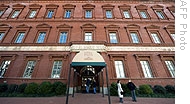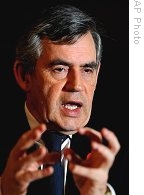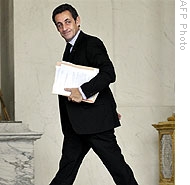voa标准英语2008年-Global Leaders Prepare for Washington Summit(在线收听)
 |
| The National Building Museum, site of the upcoming G-20 meeting in Washington, DC., 1 Nov 2008 |
When the economic crisis struck Europe, two political powerhouses stood out in their attempt to soften the blows: British Prime Minister Gordon Brown and French President Nicolas Sarkozy.
France is currently the European Union president and Mr. Sarkozy was quick to call for a transatlantic solution to the crisis.
He said Europe wishes to work hand in hand with the United States, like two allies, two friends, two partners, who have the same convictions, the same values and which must meet the challenge.
 |
| Britain's Prime Minister Gordon Brown addresses his monthly press conference inside 10 Downing Street in London, Tuesday, 11 Nov. 2008 |
Mr. Brown has experience when it comes to the economy, he was Britain's Finance Minister for 10 years in Tony Blair's government, building a reputation for competence and prudence. This October, he won praise at home and abroad for his nearly $700-billion rescue package of loans and guarantees to prop up Britain's banks.
The financial lifeline became an international template for dealing with the credit crisis.
The Brown-Sarkozy combo has become an impressive double act, said British lawmaker, Denis MacShane.
"Cometh the hour, cometh these two guys, Brown and Sarkozy, opposite sides of the political fence, but neither will gain if either Britain or France, Europe or America do not pull out of this crisis as swiftly and intelligently as they can make it happen," MacShane said.
Sarkozy pushes for euro-zone meeting
 |
| French President Nicolas Sarkozy after attending a cabinet meeting at the Elysee Palace, Paris, 12 Nov 2008 |
It was Mr. Sarkozy who insisted on a euro-zone meeting bringing together the leaders of the 15 nations that use the euro currency, as well as Britain, to come up with solutions to the crisis. They agreed to follow Mr. Brown's bank bailout plan.
It was the French leader again who urged U.S. President George Bush to convene the November 15 summit of world powers in Washington.
The next challenge for Mr. Brown and Mr. Sarkozy will be getting the United States to lead the way in repairing the global economy.
Questions remain about Paulson bailout plan
Economist Albrecht Ritschl, at the London School of Economics, said Washington must do more than simply rely on U.S. Treasury Secretary Henry Paulson's bailout plan.
"The U.S. has provided - I do not want to say lack of leadership - but the signals that came from the U.S. clearly have been a little bit mixed," he said. " It was not quite clear what the Paulson plan really meant and my impression is that few people in Washington and New York really have a very clear idea about what the Paulson plan is actually. So, quite clearly there is a need to fill these plans and ideas with content."
The upcoming G-20 meeting will focus on measures, such as financial regulation, aimed at restoring global economic stability. But analysts said Europe is already looking ahead to the change of administration. They hope President-elect Barack Obama can restore the health of the American economy, which in turn will help put the European economy back on track.